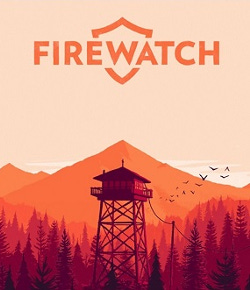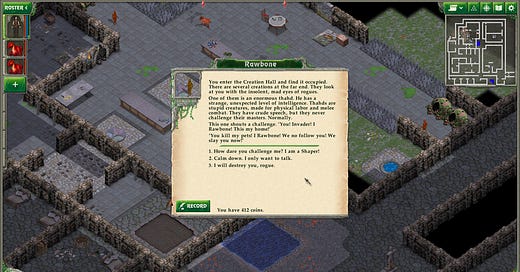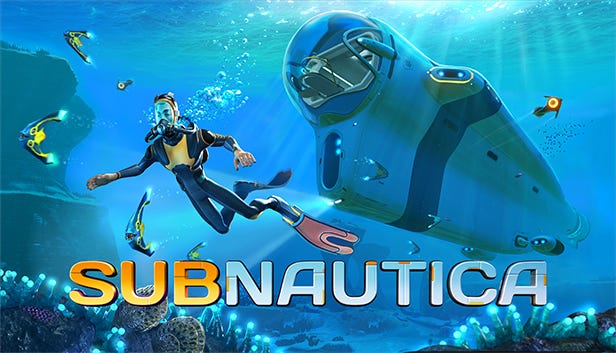Our tiny company has been earning (well, "earning") a good living making indie computer games for 27 years now. This is an extremely tough, competitive business, and we've been workin' it for a longer continuous period than just about everyone.
We write super-retro, super-low-budget games that don't look great. Never have. Never will. So how do we succeed?
The answer is: Writing. Our game design is quite solid, but the stories we tell is what keeps us in business. Our games are highly interactive novels with settings, characters, and stories that get people to actually give us real money.
Now let's be clear. I'm not a great fantasy writer. If I was, I'd be writing books nobody buys because nobody buys books anymore. Still, as a writer I'm simply competent. Which, by video games standards, makes me awesome. Overall, I'm good enough that people give me money, and that is sufficient.
I really care about video game storytelling. More than I should. Because video game storytelling is usually pretty lousy. I cherish the games that do it well, sigh at the games that don't, and quietly pull my hair out when a game with really shaky writing gets hailed as high art.
So, although nobody asked, I would like to make six observations about video game writing. These are all things I've said in the past, but I'm collecting them in one place. Then you can bask in my wisdom, yell at me, or both.
Observation 1: When people say a video game has a good story, they mean that it has a story.
Gamers have a reputation for being intolerant, perpetually angry complainers. This isn't true. Gamers are the most forgiving, tolerant audience of any media.
If your game is barely functional, somewhat coherent, and gives you a sufficiently satisfying way to grind away your time, gamers will give you a billion dollars. Games that ship in a buggy, non-function state rocket to the top of the sales charts all the time. That's how tolerant gamers are. They don't even require your product to WORK!
So, if your game has a story that coherently gets from the start to the end, has a couple memorable characters and lines of dialogue, and doesn't waste a ton of time, the world's most forgiving audience will hail it as great.
But it doesn't really matter, because ...
Observation 2: Players will forgive you for having a good story, as long as you allow them to ignore it.
Gamers don't generally care about your game's story. They want the adrenaline spikes of shooty-bang-bang, or the sweet dopamine hits from filling up status bars.
If you are in the mood for good storytelling, you can watch a movie. Or a TV show. Or (shudder) read a book. Each of these is a thousand miles beyond the best video game in terms of storytelling. Whether your tastes run toward Raiders of the Lost Ark or Hamlet or Guardians of the Galaxy or Breaking Bad, video games have worse stories. Sorry.
Doesn't matter, because the vast majority of players just tune out the story. As long as you let them skip past it, it's fine. There are a lot of people out there who have put hundreds of hours into World of Warcraft, myself included. If you quizzed us all on World of Warcraft lore, 99% of us would get an F-, guaranteed.
Good story isn't what gamers are after. Which is good, because they ain't gettin' it.

Observation 3: The default video game plot is, 'See that guy over there? That guy is bad. Kill that guy.' If your plot is anything different, you're 99% of the way to having a better story.
One of the most influential computer RPGs ever written was 1985's Ultima IV. Why? Because it was the first big RPG to have a different story.
Now? Psychonauts and Psychonauts 2 are hailed as two of the best-written games ever, and they both have this plot. They have some nice bits of dialogue and some very funny and interesting settings to leap around on, but they're still just, "Let's punch a linear sequence of plot tickets until we finally get to hit a big guy in the face." Persona 5 is a cool game with a bunch of really engaging individual chapters and I loved it, but the big ending is just punching a big glowy thing a bunch of times.
Oh sure, there are ways to spice up the pattern. You can give the bad jerk a sad backstory. You can have three bad jerks, and you kill them one at a time. You can kill the bad jerk, but then his chest opens up and a God flies out and the God is the new bad jerk and you beat it up too. (Also known as the JRPG option.)
Still the same thing. And all the tricks you can use to disguise it are getting a little threadbare ...

Observation 4: The three plagues of video game storytelling are wacky trick endings, smug ironic dialogue, and meme humor.
One of the biggest problems the industry has as a whole is that it is miserable to work in, so almost every worker bails after a decade or so. Alas, it takes many years to become a good writer. Video games are a tough medium for writing, so it takes a lot of practice to become good at it, practice most workers never get.
Thus, they have to resort to cheap tricks.
Every game writer saw The Sixth Sense and thought, "Wow! I want to do my own wacky trick ending!" Unfortunately, this almost always results in something less engaging than just telling the story in a straight-forward, honest way. Don't cheat.
Joss Whedon mastered the art of mixing serious events with wacky dialogue. In the 20th century, this was fresh. Now this is everywhere. (Borderlands is a particularly gruesome offender.) Making everything wacky and funny means that it becomes very hard to be serious, emotional, and sincere. And that is a mode you need to be in sometimes to create good writing. If everything is a joke, why care?
And meme humor is instantly dated and cringe. Portal and Portal 2 have very solid, funny writing because they made up new stuff. Every game that cribbed off of them ("Oh. The cake is a lie? You don't say.) is now dated and bears the eternal mark of lameness. Seriously, make up your own jokes! It's more fun that way!

Observation 5: It costs as much to make a good story as a bad one, and a good story can help your game sell. So why not have one?
Portal and Portal 2 were adequate, competent puzzle games elevated into hit classics by good writing. The Last of Us has decent gameplay but became a phenomenon by having a story as good as a medium-quality zombie movie. Why is Borderlands 2 the most loved, best-selling game in the series, even though the gameplay is basically the same as the others? Writing.
Observation 6: Good writing comes from a distinctive, individual, human voice. Thus, you'll mainly get it in indie games.
When you're working on a AAA game with a $300000000 budget, all executive decisions will be aimed toward one goal: Sand down any odd edges or quirky details. For a AAA game to have a unique authorial voice, it has to have someone VERY famous or influential working on it. Which doesn't happen much.
But me? I'm just a big weirdo sitting alone in a room. I can do whatever the hell I want.
The great super-power of indie developers is that we can fill in all the spaces in the market the big fish can't. No matter how low your budget is, you can always make a good story.

"Oh, so you're the judge of everyone now? What makes you so great?"
Look, making video games is difficult and expensive. Graphics, sound, coding, testing, it's an enormous effort. Compared to that, the act of putting words on paper is tiny.
So do it right! It takes so little, a clever scene, a cool character, a really fresh, funny idea, to elevate a so-so game to something great. In this context, "great" means "gets lots of free PR and sales".
Or not. If I had to compete with real, talented writers instead of middle-of-the-road AAA gray goo, I'd go out of business sooooo fast. I'll take what I can get.
If you’d like more thoughts occasionally beamed directly to your email box, subscribe here. If you want to see what we think is a decent story, you can go here.





"Psychonauts and Psychonauts 2 are hailed as two of the best-written games ever", You misspelt Planescape Torment and more recently Disco Elysium. More time has been spent discussing the story of the development of Psychonauts than it's actual story. Most the time people talk about it they talk about specific set pieces rather than the plot. Your twitter take on 2 is rather interesting but in all seriousness you should google "best written games" and tell me how far you have to scroll before you see any doublefine game in a top 10/20 list. They are beloved but you are the first person I've ever seen say they a hailed as narrative behemoths.
Completely unrelated note something else to factor in is just because players don't engage with a story doesn't mean they don't care it's there. It makes no rational sense but there are several things a game needs to be enjoyable even if most it's audience never touches it. 80% of players will never finish a game and see the finale (on average). Part of it is they don't want the game to end (you do get higher completion rates if you make it clear to the player they can playing after the main story ends, but there are right and wrong ways to do this). Part of it is they get their fill and move onto other snacks. So if 80% of the time having a finale doesn't matter, why even have it? Because if it's not there the time you put into the game feels wasted. Having an ending means the time investment feels like it's working towards something, even if you never actually see it.
Players want to skip the story and get right back into the action isn't quite accurate. They want to engage with the story at their own pace. The reason people skip the story is because devs make it necessary to do so to progress at your own pace when players aren't ready to engage at that point. And once you start skipping story beats what is the point of any of it? They'll engage with the story more when the story waits for them. They'll engage with the game less altogether if it has no story at all, even if they would otherwise ignore most of it.
Lastly one must consider the whole concept of story telling without words. Not just show it don't say it. Some games entire plots unfold wordlessly, it's a type of story telling videogames especially excel at. The first 3 Metroid games have barely a page of text between them but fans can opine for hours about the plot of the first 3 games. By contrast the Metroid game that tried to be verbally story driven (Other M) is the most reviled in the franchise and the majority of fans want it stricken from the canon. Do Metroid fans just hate story and lore? Quite the opposite. The Metroid Prime series is also well loved and it has novels worth of text in it. But that lore is engage at leisure (and was also actually well written unlike the other example). But the fact the stories of the original games (well, more the 2nd and 3rd) are probably the most fondly remembered really emphasises there is a lot more to telling a story in a game than just actual writing.
The art of story telling in games isn't really in the quality of the writing. It's in the presentation of it.
If Guardians of the Galaxy is in your range of acceptable stories (I think it's fine, not dragging it - the characters are all essentially the same variety of idiot with a different neurosis though) then dismissing all game stories comes off as the bad kind of hyperbole. You mentioned two games yourself that I'd put over that - the Portal games easily have better writing. Looking beyond, you have Grim Fandango, Disco Elysium, Star Control 2, Killer 7 - there are more I wouldn't be embarrassed to add. It's a short list, but it's a list. Dwelling on the recycling of basic plot structure is Cinema Sins-level garbage analysis, not going to bother with that. I don't even disagree with the core of your thesis - games writing is far from fantastic overall - but you make me want to not agree. If that was the point: congratulations, you did a controversy on the internet. Real hard to get people yelling about stuff on the internet - great job there.